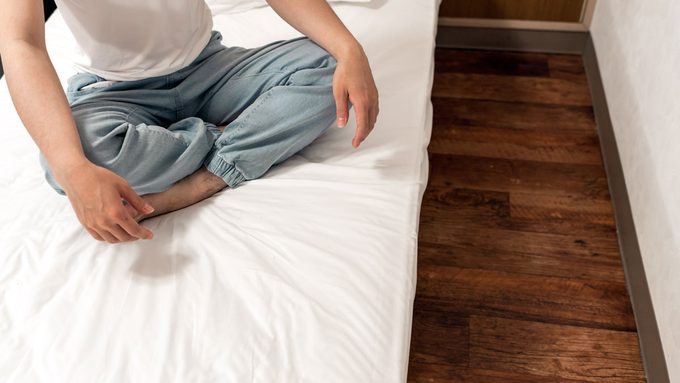Natural Home Remedies: Restless Legs Syndrome
Are your twitchy legs keeping you up at night? Get your legs to settle down with these home remedies for restless legs syndrome (RLS)

Of all our body’s mysteries, this is surely among the quirkiest. When you’re otherwise ready for rest, why should your legs keep running? When every fibre of your being says, “Settle down!” why are you gamely kicking your bedmate? Since restless legs syndrome (RLS) seems to be related to mineral imbalances, perhaps the best place to end the night race is with supplements. But if they don’t stop your in-place pacing, you’ll want to develop some pre-bed rituals to help those legs settle down.
Run out for supplements
- Each day, take 500 milligrams of magnesium, 800 to 1,000 milligrams of calcium, and 800 to 1,000 milligrams of potassium. A shortage of any of these minerals can make your legs more twitchy.
- Drink mineral water that’s high in magnesium. The optimal magnesium level is in the range of 100 milligrams per litre of water.
- Bump up your intake of folic acid, a B vitamin (also called folate). Folic acid helps build red blood cells, which in turn helps oxygenate the body. That’s an important benefit, since RLS is associated with a decrease in oxygen. Food sources of folic acid include leafy green vegetables, orange juice and beans. You’ll also find folate in most multivitamins.
- Eat iron-rich foods such as dark green vegetables, liver, wheat germ, kidney beans and lean beef. Iron is part of the myoglobin molecule, which is a protein that stores oxygen in the muscles until it’s needed. Without iron, myoglobin can’t hold enough oxygen, and muscle problems may develop.
The home stretch
- When you get the urge to move your legs, start rubbing them, or stretch them to their full length and point your toes. These intentional movements send signals to your brain that can override the strange tingling sensations of RLS. But be sure to stop if the stretching produces a charley horse or leg cramps: Those are strong indications of magnesium deficiency and can’t be alleviated by stretching.
- Sit on the edge of the bed and firmly massage your calves to give the muscles deeper stimulation.
- If those treatments don’t calm your legs, get up and go for a brief walk around your home. Take long steps and bend your legs to stretch the muscles.
Before you go to bed
- Sit in a tub filled with comfortably hot water for 10 to 15 minutes before you go to bed.
- Chilling your legs may also help. Rub a cold pack on your legs before you go to bed.
- Or combine the heat and cold treatments. Dip your legs in a comfortably hot bath for two minutes, then apply the cold pack to your legs for a minute. Repeat several times before bed.
Make steady progress
- After you get into bed, practice the calming ritual known as progressive muscle relaxation. Breathe deeply for a few minutes, then tense the muscles in your feet. Hold the tension for a few seconds, then relax. Next, tense your calf muscles, hold, and relax. Then do the same with your thigh muscles. Repeat the tensing-and-relaxing pattern, working all the way up your body to your neck and face muscles. When you’re finished, your whole body should feel relaxed.
Dip into homeopathy
- Homeopathic doctors recommend Causticum at the 12C dilution for legs that are restless during the night.
- Another option is a 12C dilution of Tarentula hispanica, three times a day until you see improvements in symptoms.
The power of prevention
- In the evening, avoid alcoholic or caffeinated drinks, which stimulate the muscles and nerves in your legs.
- Studies have found that smokers are more likely to have RLS than people who don’t smoke.
- Avoid cold and sinus medications, which can make RLS symptoms much worse.
Don’t miss out! Sign up for our free weekly newslettersand get nutritious recipes, healthy weight-loss tips, easy ways to stayin shape and all the health news you need, delivered straight to yourinbox.




